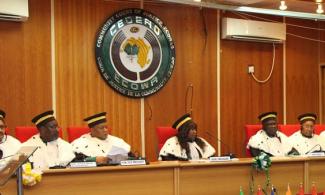
In a suit filed by the incorporated trustees of Laws and Rights Awareness Initiative, the non-governmental organisation challenged the competence of Nigeria’s Cybercrime (Prohibition and Prevention) Act 2015.
The Community Court of the Economic Community of West African States has ordered the Nigerian Government to either repeal or amend its law on cybercrime to align with its obligation under Article 1 of the African Charter on Human and Peoples’ Rights and the International Covenant on Civil and Political Rights.
In a suit filed by the incorporated trustees of Laws and Rights Awareness Initiative, the non-governmental organisation challenged the competence of Nigeria’s Cybercrime (Prohibition and Prevention) Act 2015.
Delivering judgment on Friday, Justice Januaria T.S. Moreira Costa held that portions of the law violated Nigerians’ right to freedom of expression.

He held the Nigerian Government liable for the violation of the right to freedom of expression by the adoption of Section 24 of its 2015 Cybercrime Act.
The court also rejected for lack of evidence other claims made by the plaintiff in relation to the contention that the law violated its members’ right to freedom of expression.
In the initiating application ECW/CCJ/APP/53/18 filed before the Court on November 6, 2018, the plaintiff through its counsel, Mr Chukwudi Ajaegbo, claimed among others that their members’ freedom of expression on the internet or in the use of computer devices was limited/breached by Section 24 of the Cybercrime Act of the defendant state.
It also claimed that nine of its collaborators were arrested and detained in connection with the enforcement of the provision of Section 24 of the Cybercrime Act in violation of Articles 9 of the African Charter on Human and Peoples’ Rights, 19 of the International Covenant on Civil and Political Rights, and 39 of the Nigeria’s constitution.
The plaintiff argued that Section 24 contained vague concepts that allowed for arbitrary interpretation and application, and that the restrictions it imposes were not reasonably justifiable as they did not pursue legitimate objectives, necessary nor proportional.